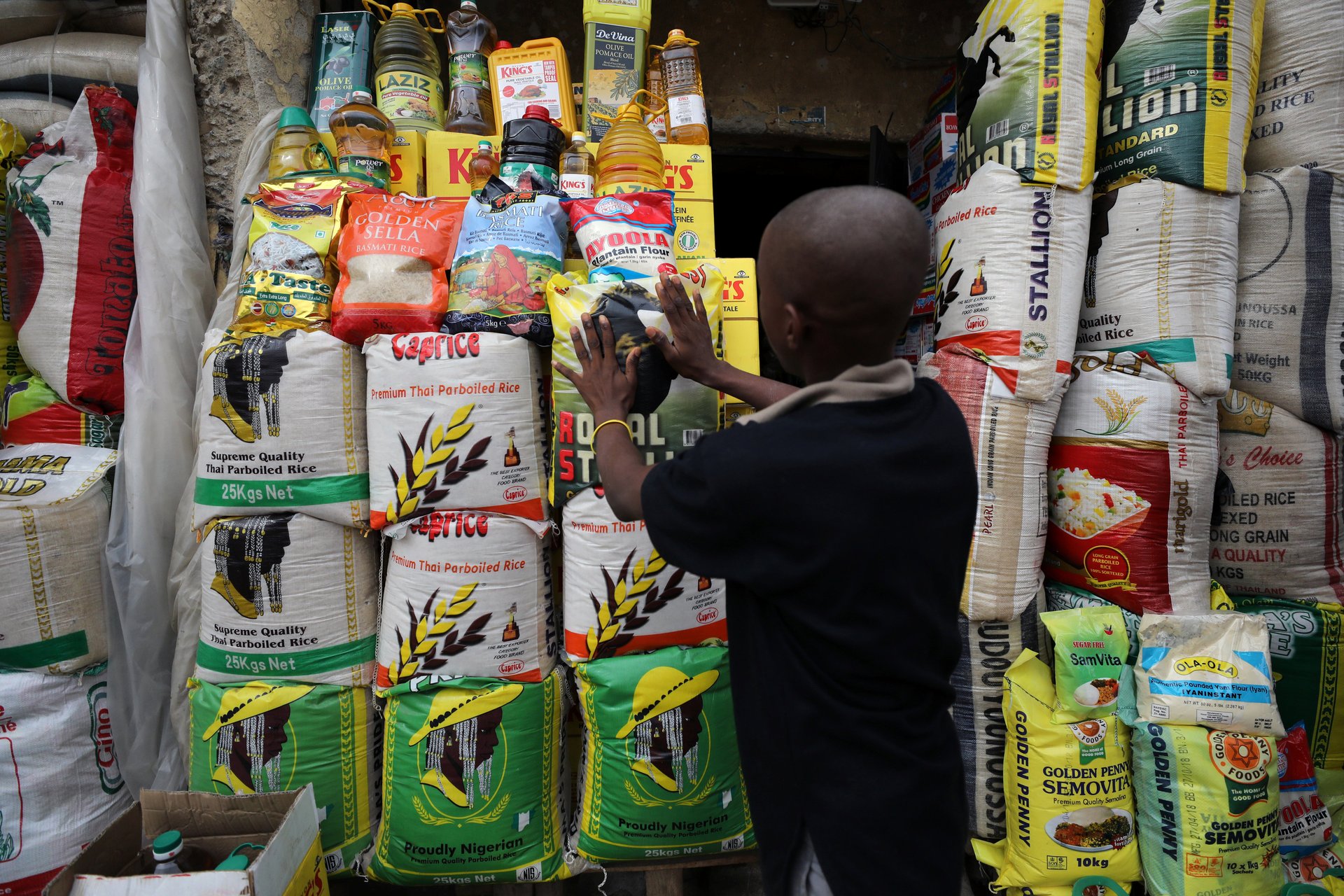Nigerians love rice but don’t grow enough so even 70% tariffs haven’t slowed imports
Rice is Nigeria’s most popular food staple.


Rice is Nigeria’s most popular food staple.
A few generations ago, pre-independence in 1960, long grain rice was something only elites had with any regularity, for many Nigerians it was something for the weekend or special occasions. Most people’s staples were dominated by root vegetables like yam and cassava or grains like corn or millet.
Today, everyone eats rice in Nigeria. It cuts across the ethnic and religious divides in Africa’s most populous country and is consumed across households, from low to high-income. Over time, rice has evolved from being regarded as a luxury dish to being an everyday meal.
In fact, rice is the face of Nigerian cuisine with fun pan-African debates over who makes the best Jollof rice dish. With no obvious substitute grain as widely available or consumed combined with Nigeria’s continued population growth, the demand for rice is unlikely to slow down.
But this popularity, universality and growing demand has also meant rice has in time become Nigeria’s most political food. For decades there have been everything from policy battles, outright bans and numerous corruption charges as Nigerian leaders have tried to figure out ways to ensure there’s enough affordable rice available to keep citizens happy. One of the many reasons for this is Nigeria never really had a big rice farming culture, at least not at sufficient scale to satisfy the country’s hankering for rice. This has meant much of the controversy around rice has been about whether to allow rice importations or/and how much to import.
Since coming to office in 2015, Nigeria’s president Muhammadu Buhari has repeatedly talked up plans to achieve food sufficiency and boost local agriculture with rice as a centerpiece of that strategy. To that end, a crackdown on rice imports with tariffs and levies totaling 70% and a $150 million loan scheme for local rice farmers were put in place. The idea the government had was to make imports less attractive while also boosting production and consumption of local rice.
The tactic appears to have worked with latest data from Gro Intelligence showing local rice production has grown by 60% in the last five years, peaking at 4.8 million metric tons over the past year.
But there’s a catch: local production still cannot match domestic demand.
And despite the government’s high tariffs, that supply gap is still being plugged by imports which have not dropped significantly. Even worse, some importers are avoiding the steep import tariffs—and rewarded with healthier margins—by smuggling rice through Nigeria’s porous land borders, despite the high risks.
Debisi Araba, regional director at the Nairobi-based International Center for Tropical Agriculture, says the tariffs will likely remain ineffective in reducing imports given rising local demand. ”The rice tariffs have minimal impact on the rice market,” he says. “Because ultimately, imported rice is making its way into the country whether legally or otherwise.”
“As long as the demand is still there and there’s a gap, people will fill it,” says Tunde Leye, consulting partner at SBM Intelligence, a Lagos-based research firm. Despite higher tariffs and risks, “smuggling and imports are still having to supply a significant portion of consumption, so the economics still make sense for the importer,” says Leye.
Rather than “obsessing” over imports, Araba argues, players in the sector should be more focused on investing in agronomy and improving yields which have, so far, only shown marginal growth. “That’s due to a number of factors [including] access to irrigation and proper agronomic practices,” he says. “Agriculture is really sophisticated and you can’t reduce it to distributing fertilizers to farmers,” adds Araba who also served as special adviser to Nigeria’s former minister of agriculture, Akinwumi Adesina.
In attempting to clamp down on imports while local production still falls short of demand, Leye says the government is chasing the wrong priority. ”The correct goal we should be pursuing is that food should be cheap so that the portion of the income of the average Nigerian that goes to food is reducing,” he says. Given that the government’s loan scheme for rice farmers has been saddled by fraud allegations and high rates of loan defaults, it can hardly be classed as a sustainable, long-term fix.
To kick-start and sustain its ambitious agriculture revolution, the government will be better served plugging the enduring loopholes along the local agriculture value chain. The long-running issue of produce failing to reach the market owing to transportation and preservation problems largely remains unsolved. And lingering pastoral conflict in Nigeria’s major food-producing regions have posed a new challenge—and impacted productivity—over the past few years.
In the meantime, Araba recommends a change in the government’s aggressive rhetoric on rice importation. “It’s not an invasion of foreign rice,” he says. “Just think about it as honest farmers in other countries being more competitive than your farmers so focus on making your farmers more competitive.”
Sign up to the Quartz Africa Weekly Brief here for news and analysis on African business, tech and innovation in your inbox